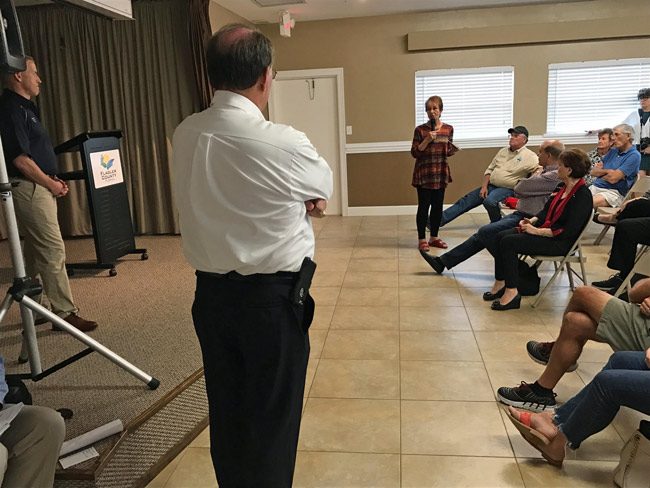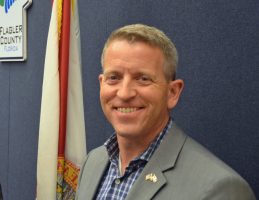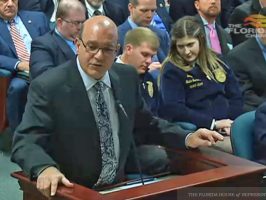
The legalities of Flagler County’s—and Florida’s—vacation-rental landscape made it through the Legislature’s 2017 session unscathed: bills that could have made local regulation of the industry difficult or impossible died Friday when the Senate did not take up a proposal that had passed the House, 63-56, days earlier.
For Flagler County’s 100-odd vacation rental properties, almost all of them concentrated in the Hammock, that means the law the Legislature passed in 2014 enabling county government to regulate the industry remains in place.
But the battle isn’t over. Expect to see it return in the next legislative session as the measure’s Senate sponsor, Greg Stube, the Sarasota Republican, vowed, according to press reports, that he “won’t rest until this issue has been adequately addressed in favor of the rights of owners of real property.”
“We can count this year as a victory and that the bill was defeated,” Rep. Paul Renner, whose district includes all of Flagler County, said in an interview this afternoon. “It was done with considerable help from Sen. Hutson in the Senate and the House, as you saw, we had an opportunity, we came up short in committee to beat the bill and it passed pretty comfortably in the house.”

Flagler County was at the forefront of getting the 2014 bill written and enacted. It was at the forefront of fighting its repeal this spring., It will be at the forefront of fighting renewed attempts at repeal next year, said Al Hadeed, the county government attorney. He spoke as if certain that the attempt to roll back the 2014 law will be renewed. “Those that have reached out to me indicate their strong interest in fighting these bills when they come back,” Hadeed said. “This is a rage that has not been quelled. They are ready to fight when it comes back.”
The rage is on both sides of the issue, with vacation rental proponents describing it as a matter of property rights and equity. It wouldn’t be accurate to portray those on the opposite side of the issue as “opponents” of vacation rentals: that’s not where the fault line falls. Rather, those who opposed the measures before lawmakers in the session just ended would rather be described as pro-regulations, or pro-home rule, without wanting to crimp the vacation rental industry beyond certain regulatory strictures. In sum, they want to preserve the 2014 law that protects vacation rentals but also allows local governments to regulate them, seeing in that law the proper balance between interests in play.

The 2014 law was the result of intense lobbying by Flagler government and swaths of Hammock residents upset at the effects of a 2011 law intended to spur vacation rentals. That law was successful in that regard. But the same law also forbade local governments from imposing any kind of regulations that single out vacation rentals. So it led to conflicts between owners of vacation rental properties and permanent residents who felt the character of their neighborhoods was being altered by the party-like atmosphere that surrounds vacation rentals. Both sides could legitimately claim that their property rights were being infringed.
For two years residents and county government urged lawmakers to return regulatory authority to counties. Lawmakers did so in 2014, and Flagler County quickly crafted an ordinance regulating safety, noise and registration matters at vacation rentals. Other communities followed suit. Then a few horror stories about outrageous fines imposed by local governments cropped up, though those stories had nothing to do with Flagler’s regulations. Locally, an early lawsuit brought by the vacation rental industry settled matters largely (but not entirely) in Flagler’s favor, and subsequently, mediation has resolved many disputes between property owners and the government. Still, the mere fact that mediation has been necessary was brandished by proponents of the new bills as justification to repeal the 2014 measure. Hadeed and local government officials, aided by significant public support from the Hammock, disagreed.
Week after week county officials, usually one county commissioner or another with Hadeed, shuttled to Tallahassee and back to appear before House and Senate committees. They did so six times, alongside other roomfuls of proponents and opponents.
It would turn out to be one of the more contentious votes of the legislative sessions, and one of its least partisan: proponents and opponents of the measure criss-crossed party lines, demographics and geography. Generally, supporters of regulation rollbacks were lobbyists and representatives of the vacation rental industry itself. There were errant individual homeowners here and there, but by the time the bills made their way to latter hearings, even those had vanished, likely because existing regulation does not prevent property owners in the right zones from using their houses as vacation rentals.
Opponents of the roll-back were represented more numerously and by many local governments, homeowner associations and the like. Lawmakers took notice, and the tenor of hearings changed, as, indeed, did the bills, especially in the Senate. By the time the Senate version reached its second of three stops before the floor of the Senate (which it never reached), the bill had essentially been eviscerated and turned into a neutral restatement of certain principles without touching the 2014 regulatory allowances. It had changed so much that Hadeed, appearing before that committee, declared Flagler County’s position as “neutral” regarding the bill. So did previous opponents.
But the House version preserved its anti-regulatory teeth, and advanced to that floor vote. Despite that, Hadeed saw the floor debate as a good omen for the 2014 law, even if it were to face another onslaught next year.
“I believe the reason we had the robust debate and a more informed group of legislators understanding that the local home rule provided by 2014 was appropriate,” Hadeed said, “came about because of more engaged citizens who understood the issue, homeowners associations, community associations, property associations, cities and counties who exercised their right to present their views to their legislators, and the volume of email that legislators received, the volume of calls. We had our own town hall meeting in Flagler, there were similar gatherings around the state where people shared their stories and objected to what Rep. la Rose and Sen. Steube tried to accomplish.”
That groundswell carried over to hearing chambers in Tallahassee. “That’s very extraordinary, elected officials from very small municipalities came to participate in the process,” Hadeed said. “They don’t see that very often.”
There was a last-ditch effort to get the Senate to hear the bill again, with no fewer than 11 amendments filed in the last 48 hours of the regular session (up until Friday), five of them by Steube. It didn’t work. The bill was not taken up again, and so it died.
It could have died much earlier had Sen. Travis Hutson, who represents Flagler, had himself sponsored the 2014 law, and who chaired the first Senate committee scheduled to hear it, chosen not to place the bill on the agenda for a hearing. But he did so, and provided little compelling opposition to its proponents, disappointing local leaders and making them wonder whose side he was on. Renner was more directly engaged as he spoke in opposition of the proposals.
Proponents of the 2017 roll-back, including La Rosa and three industry representatives, did not respond to calls or emails.





























Bc. says
The home owners who retired here in Florida do not want this bill. So this gives us enough time to send the law makers who don’t care about us packing we will vote them out for sure. They care more about the lobbyists the us now it’s time to get rid of the bums.
Facts says
In 2011 our legislature removed local property zoning. Zoning has been in existence for decades. If there was ever a property rights breach it occurred in 2011. How can a local government establish plans for these public lodging establishment businesses when developing their comprehensive plans for community infustructures prior to 2011? What public lodging establishment business was permitted to operate in residential single family neighborhoods prior to July 2011?
Our legislature should correct a wrong. If they where concerned about property rights they should restore zoning in the single family neighborhoods that where planned or under construction prior to July 2011.
Senator Steube and Representative LaRosa knowing work with one group on these two bills. That group represented the Florida vacation management association, AIRBNB, Homeaway, Florida Realators Association and the national Realators Asociation. Their lobbyist Lori Killinger created this mess. We need our legislature to work with their constituents that elected them in office and hear both sides of the issues. Not just one side who wants to operate unregulated businesses.
There are a lot of people that do not know what a vacation rental is. These dwellings may have been built as a single family homes according to their certificate of occupancy but so where bed and breakfast. Both of these busnieeses operated transient activities. Both use a licensing agreement. These dwellings operate a daily, weekly or for less than 30 days just like a hotel or motel. They are not a rental or lease. There is no transfer of property rights from the owner to the tenants.
Why are bed and breakfast operations not permitted in areas zoned as R1 residential? Because they are transient public lodging businesses just like a hotel or motel. If a vacation rental conducts the same operation why is this the only transient public lodging establishment exempt from our local property zoning laws?
Even the insurance industry has it right. All vacation rentals are considered a commercial busniess operation. They require commercial insurance to operate,your homeowners policy must be updated to the proper insurance prior to operating.Why do our legislature continue to treat these dwellings as homes? They are not homes once they apply for a state business license. These dwellings need to be classified as Vacation Rentals just like a home that was license as a Bed and Breakfast. Does your home use between 35,000 to 55,000 gallons of water per month? These over occupied dwellings do. Was your residential community infustructure built for this type of abuse?
All Florida residents need to speak up in unity. Tell your representatives to protect our single family neighborhoods now! This was never a property rights issue. It was made an issue by our legislature back in 2011 when they allowed illegal unregulated business operations in our communities.